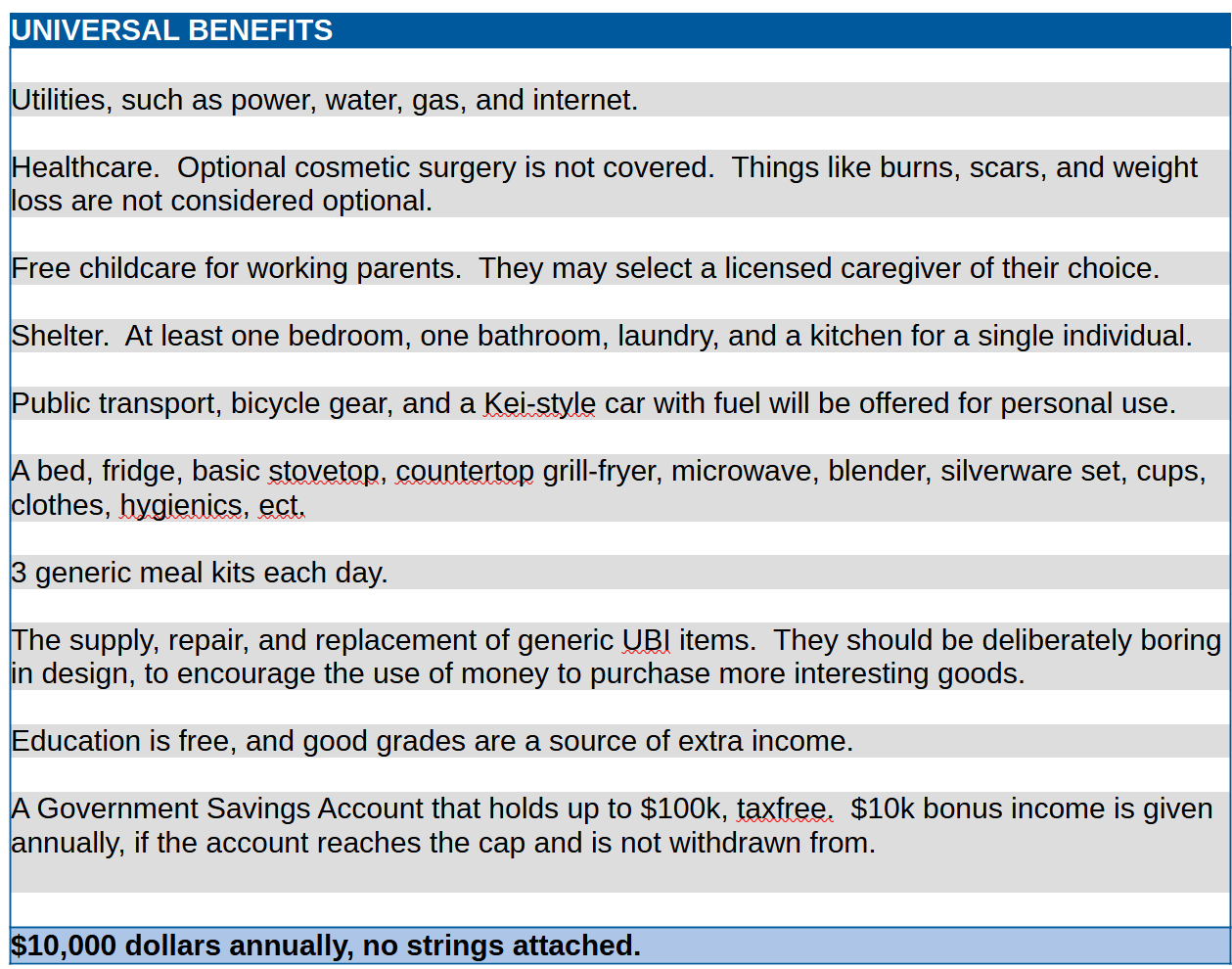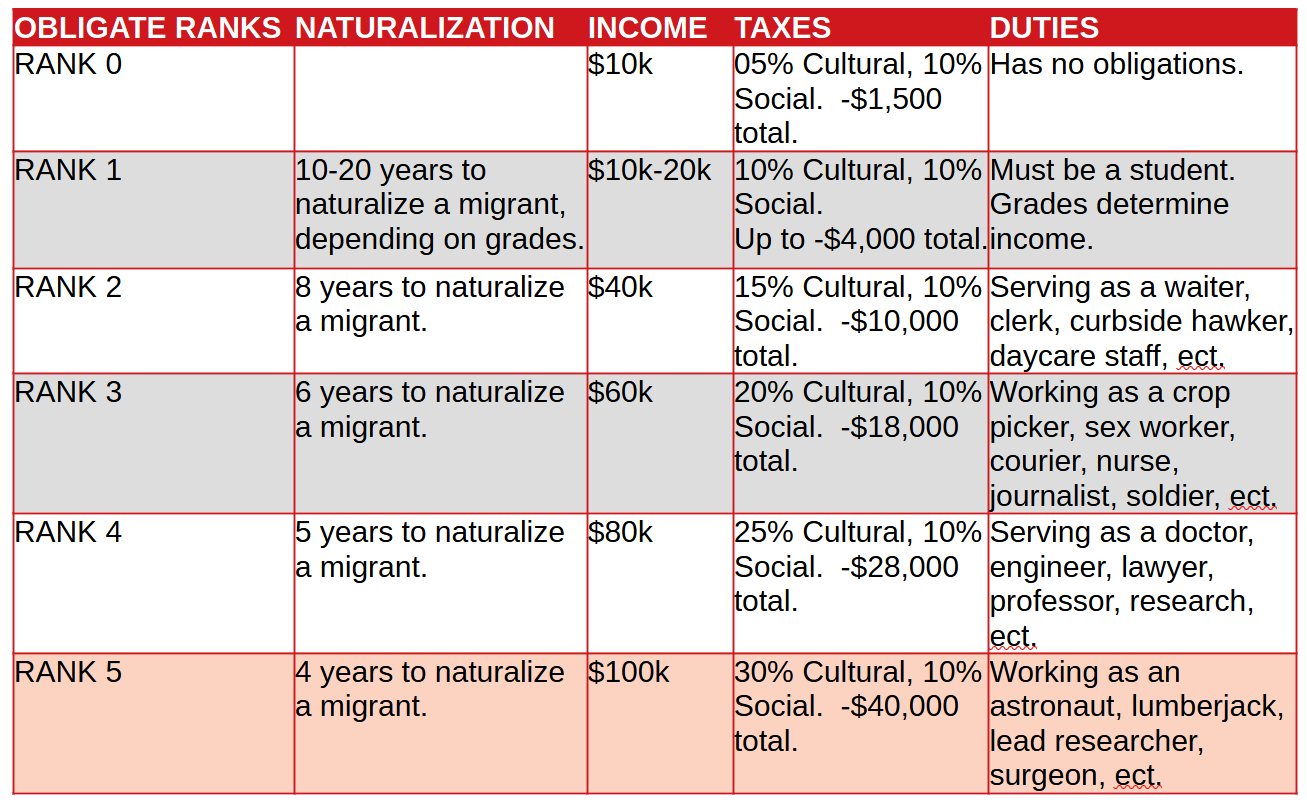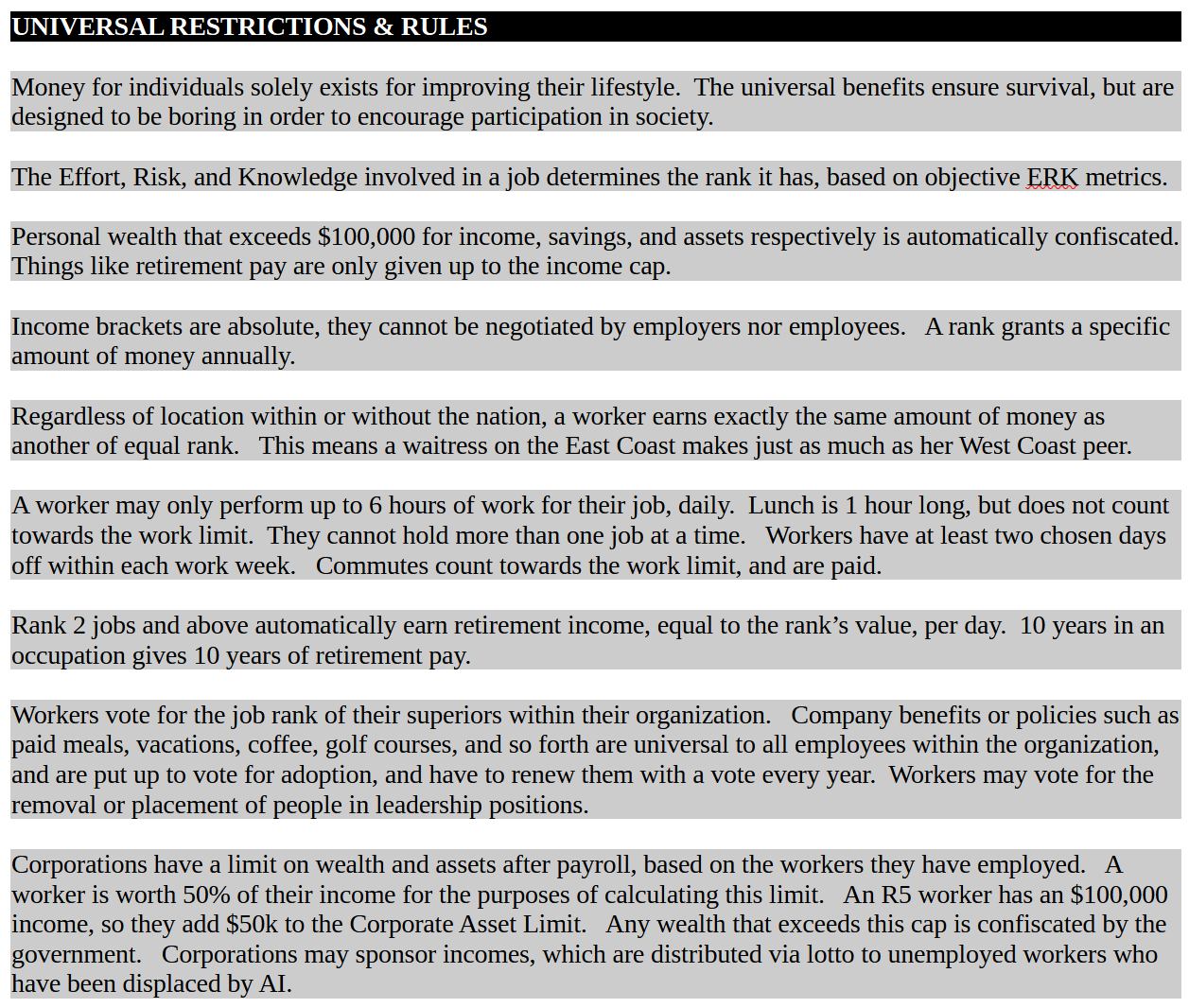So.. Umm, where is the actual research paper? I could not find any links to an actual study anywhere on the project site?
Futurology
The only reason the rich cunts try to tell us you 'can't just GIVE people free money' is because they want all the free money for themselves.
Every single UBI experiment has the same results, it's wildly successful. The only reason it will never happen for most of humanity is capitalism.
I think one way to implement UBI, would be what I call a "Universal Ranked Income". Everyone gets universal benefits - shelter, utilities, food, transport, gasoline, healthcare, all of this for free. However, the items and services are very generic. This is where capitalism steps in: money is used for buying luxuries, such as a fast car, physical books, a nicer home, fancy takeout, and so forth. Capitalism is terrific for catering to an individual's tastes, but is horrible at ensuring wellbeing. Thus, the separation of necessity from luxury.
This permits people to strike or protest when they feel like it, since their survival isn't at stake. They also can wait for suitable job opportunities, which would do much to punish abusive corporations. The amount of income a person gets is based on their job rank, with students getting an amount based on their grades, while higher tier workers get fixed incomes each year, regardless of experience or location.
Absolute floors and ceilings on wealth and income can also be implemented. That would prevent the accumulation of too much wealth by individuals and corporations. Corporations won't be able to control the wages of their employees, which would also prevent inflation - people can't be paid too much or too little for working, so pricing of goods will have be done according to what income bracket a seller wants to reach.



There are so many issues with this. Unsolvable issues.
The first that I saw was basing income on grades. This means that the person who determines whether you fail or pass, also determines how much money you get. I don't think there is any good teacher out there that wants that responsibillity. So fuck that. Grades are for determining whether you pass or fail. The government should not use them for their own needs. If they so desperately want that, then let them make their own tests and grade these themselves.
The second is fixing income. If I do better than my peers, I want to be recognized for that. Otherwise, why would I put in the effort? Maybe this works for super simple jobs, like fruit picker on a farm. But anywhere where cognitive skills are required, you need to incentivise people to excel.
And that was still talking about jobs where you spend a fixed amount of time working. There are also many jobs, where it makes wayyy more sense to pay directly for delivered performance. For example: how do you fix the salary of a sex worker? Does that mean you fix the pay rate for the customers? Demand for certain people certainly won't be equal, so how do you fix that?
What about overtime? What about working during holidays/weekends? What about nightshifts? Etc.
Then there is the issues of different personal survival needs. No single set of 3 meals a day will be both allergy-safe for everyone and nutricious enough to survive for everyone. Some people live fine without a microwave, others can't live without it. Etc. Just giving people money removes the responsibility of determining what exactly is required for survival.
Then there is the issue of labor shortages. Take the Dutch childcare system for example. For many years now, the government has had the idea of lowering the prices significantly. But they can't, because the number of licensed caretakers is already not enough to fullfill demand right now, and lowering prices would skyrocket demand.
The whole point of UBI is to let the market figure out many of the solutions to these problems. Keep it simple for the government, and only regulate when and where it actually helps.
When it comes to ranking job classes, it should be based on developing ERK metrics: Effort, Risk, Knowledge. This obviously would require many researchers to verify certain things: how many hours can the average person work in a field before needing a break, how many years of education before the average person can do a job effectively, and the frequency of death or injury from the task, and so on.
In any case, the income based on grades is for education - the idea being that students get paid for learning, and the more effective they are, the sooner they stop being students and enter the job market. The schools receive money for the grades students have, but have no part in the grading. It should be the state and federal government, through dedicated teams, that students are graded on tasks. Through the internet, it would be easy to transfer, archive, and grade copies of student work to these graders. This allows teachers to focus on teaching.
As to "If I do better than my peers, I want to be recognized for that. Otherwise, why would I put in the effort?"...honestly, I want this mindset to go the way of the Dodo. Your premise here is the very foundation of the rat race, because it creates excuses for individuals to be treated better than others in the workplace. If people do a job, it should be because they think it is neat, not so they could climb a social ladder.
When it comes to something like sex work, it can be based on whether you worked that day. If you did a lot of customers or just one, you get paid the same. While a company can certainly fire slacking workers, they also run a risk of an issue: worker votes. Workers, both fired and currently on staff, should be able to vote for leadership positions and benefits within a company. If workers don't get enough clients, the company won't make enough money to pay workers - so they are incentivized to find fair bosses who can dole out enough clients among the workers.
I would consider overtime and hazard pay to be the same issue. They can simply cause jobs to double in pay when in effect. Companies would try to avoid this when possible, so you would have the electric company trying to consistently maintain their infrastructure and services during regular hours. Night shifts can simply go to people who prefer them - after all, people have Rank 0 UBI. They are doing a job because they feel like doing so, and they will gravitate towards what feels most natural. Holidays are simply paid like any other day, regardless of whether anyone works.
The survival needs are a non-sequitur. "3 meal kits" means "3 meals a day", of which people can obtain the types that suit their dietary needs. It just means that these kits are standardized. Hotdog #1 (regular) and Hotdog #6 (Halel), and so forth. The important thing here is that government offers a baseline quality and availability for food that anyone can obtain.
As to labor shortages, that is a problem - but one not unique to UBI. The best solution in that case is to encourage students to enter the workforce, by offering a benefit to graduate from schooling. Which is why all jobs have at least double the income in a ranked system.
There are two kinds of peer reviewed research I like. 1. The amazing wild nobody ever expected it sort of results that upset multiple fields of research. And 2. The gradual, incremental improvements of what we already thought, but now with even better data. The former is uncommon and exciting; the latter merely extends the sphere of knowledge in expected ways. This clearly falls into category #2, so Yay!
Very interesting. Some actual data to go with all the political bluster surrounding the idea of a Universal Basic Income.
There’s been data for years, maybe over a decade now. It’s just on the list of subjects the rich don’t want the poors talking about so they bury it.
There is a lot of data out there in the US, they're trying it in a lot of places.
curious where Alaska's pfd falls on the scale, or if it isn't counted because it isn't consistent or part of a controlled study.